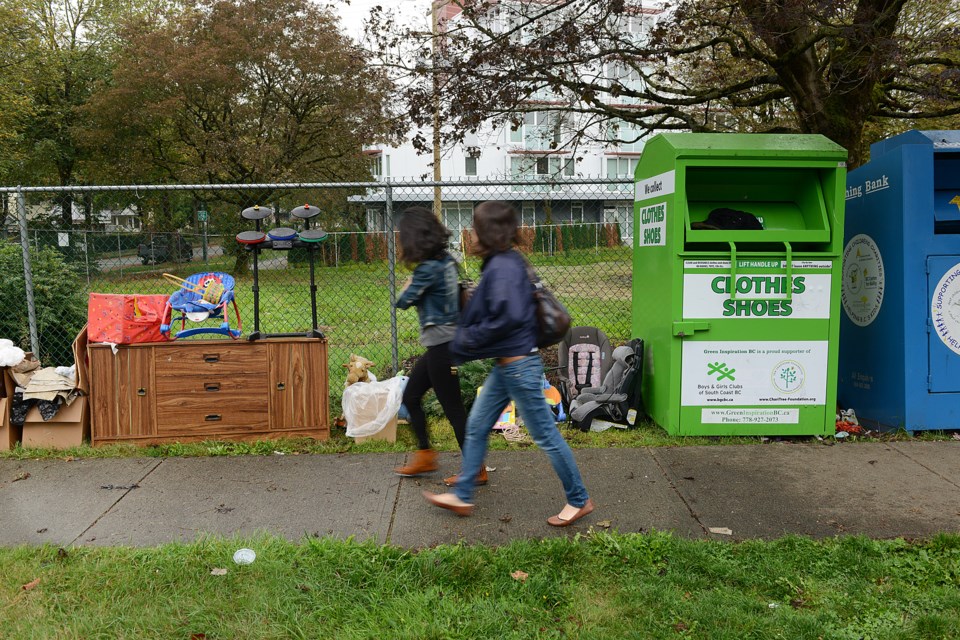Charity donation bins on the west side of Main Street near West 37th Avenue have been overflowing with used clothing and become a magnet for illegal dumping.
And that’s not unusual in a neighbourhood where for many people taking out the trash is too costly.
After checking out the used goods piled high against the bins in the past week, one might guess the majority of the dumping was done in good faith in hopes another family might pick up the used car seats, plush rocking horse, infant bouncy chair, dresser, chairs and end tables. But with the beginning of the rain this week, what may have started out as good intentions has turned into a soggy mess.
East Side resident Nick Vaughan was not surprised the largely low-income tenants of the neighbourhood are using these donation bins to dispose of clothes, furniture and toys.
“The city has made going to the dump more and more expensive over the last decade,” said Vaughan, who works with at-risk and low-income youth and is familiar with the difficulties they experience when moving. “You used to just pay by the kilo, so a little bit of trash cost you $3 or $4 bucks, now there’s a minimum charge.”
To dispose of a mattress and box spring at the city’s transfer station costs $30, something Vaughan says many low-income residents can’t afford.
Many low-income residents don’t own a vehicle, which makes it even more difficult when it comes to disposing of furniture and large household items.
“That’s why you see mattresses dumped down back lanes all over the East Side,” said Vaughan. “Getting their garbage picked up only every two weeks can’t help so it doesn’t surprise me people are looking for somewhere to get rid of their stuff.”
In 2011, Peter Judd, general manager of engineering for the city, told the Courier the city has no permit process in place for the bins but was working on guidelines for their placement.
According to an unattributed email from the city this week in response to questions from the Courier, permits are still not required. The email explained the majority of bins are on private property but at this time the city allows them to also be placed on public land. Should the area around the bins need to be cleaned up, the city says it’s up to the charity to complete that work. Where there is an ongoing concern, the city asks the charity to remove their bin. Complaints are typically received through the city’s 311 service and dealt with accordingly. There were about 175 complaints received in 2013.
The Courier asked the city if it’s able to bill the large corporations that own the bins for any cleanup but received no reply.
As reported earlier in the Courier, while many residents believe the gently used clothing their child have outgrown will be donated directly to a recognized charity via a bin, that’s not the case. Instead most donations are sold by American, for-profit corporations, which pay the charities a fee to use their name.
In Vancouver, that means much of the clothing donated is sold for profit at a Value Village location. The Value Village thrift-store chain is owned by the Bellevue, Wash.-based, for-profit corporation Savers Inc. Exceptions to that arrangement include the Salvation Army and B.C. Children’s Hospital Auxiliary, which jointly give away much of the donated clothing to needy residents. They sell the rest locally and share the profits.
In 2012, the CBC reported these bins are so lucrative in Ontario that “cut throat turf wars” are breaking out. The article added that in 2010, Canadian exports of worn clothes were valued at $174 million. Ontario’s share of that market was more than $132 million with the majority of goods headed to African countries, India and Pakistan. The Recycling Council of B.C. was unable to provide a similar breakdown for B.C.
When it comes to books, about a quarter of those donated end up for sale on American online retail sites such as Amazon, eBay, Alibris and Barnes & Noble, with profits going to Thrift Recycling Management, a for-profit company based in Tacoma, Wash. Another 25 per cent of the books, such as old textbooks and encyclopaedias, are pulped, while in B.C., the remainder are donated to needy libraries and literacy programs through the Reading Tree, the non-profit arm of Thrift Recycling Management.
sthomas@vancourier.com
twitter.com/sthomas10



